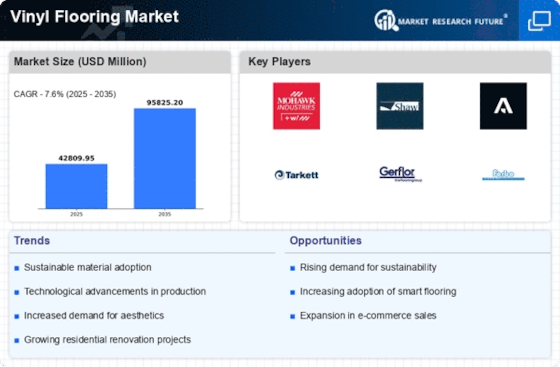Top Industry Leaders in the Vinyl Flooring Market

Vinyl flooring, once relegated to dingy kitchens and school corridors, has undergone a vibrant metamorphosis. This versatile and resilient material, But beneath its sleek surface lies a competitive jungle where established giants like Tarkett and Mannington Mills clash with agile newcomers, all vying for a square foot of market share. Let's delve into the strategies, trends, and recent developments shaping this dynamic landscape.
Strategies Flooring the Competition:
-
Beyond the Basic Plank: Leading players are expanding beyond traditional sheet and plank vinyl, venturing into luxury tile formats, customizable click-lock systems, and even textured wood-like finishes, catering to diverse design aesthetics and functional needs. -
Sustainability Spotlight: Green credentials are the new must-have. Armstrong Flooring is leading the charge by developing recycled content and bio-based vinyl options, aligning with environmental regulations and eco-conscious consumers. -
Technological Twists: Innovation is the key to unlocking resilience. Forbo Flooring Systems is pioneering antimicrobial and stain-resistant vinyl formulations, catering to high-traffic areas and hygiene concerns. -
Geographic Expansion: Emerging markets like China and India present fertile ground for growth. Mohawk Industries, for instance, has established production facilities in these regions to capitalize on the surging demand for affordable and stylish vinyl flooring solutions. -
Vertical Integration: Gaining control of the supply chain is crucial. Gerflor is acquiring raw material suppliers and investing in advanced manufacturing technologies, ensuring quality control, cost-effectiveness, and a competitive edge.
Factors Shaping Market Share:
-
Vinyl Type Matters: Different types offer distinct advantages. Luxury vinyl tile (LVT) dominates due to its durability, design versatility, and ease of installation, while sheet vinyl finds application in budget-conscious projects. Shaw Industries excels at tailoring vinyl options to specific price points and performance needs. -
Regional Trends: Cultural preferences and building regulations influence market dynamics. Europe, for example, favors thinner and more environmentally friendly vinyl options, while the US market leans towards thicker and more durable formulations. Flooring Industries, Inc. adapts its offerings to regional trends and preferences. -
Cost Competitiveness: Price remains a crucial factor, particularly for large-scale projects and budget-conscious consumers. Asian manufacturers often offer cost-effective options, while European and American players command premium prices for high-performance, design-forward vinyl solutions. Congoleum Corporation focuses on balancing affordability with quality and innovation. -
Technological Advancements: New manufacturing techniques, textured finishes, and even waterproof and soundproof options can disrupt the market. Interface, Inc. is exploring the use of bioplastics and recycled materials in vinyl production, potentially revolutionizing the industry's sustainability footprint. -
Focus on Sustainability: Stringent environmental regulations and consumer awareness of vinyl's potential health concerns are driving the market towards sustainable and eco-friendly solutions. The European Union's REACH regulation, for instance, restricts the use of certain chemicals in vinyl flooring, prompting manufacturers to invest in safer alternatives.
Key Players:
- Gerflor Group
- Mannington Mills Inc
- Tarkett Group
- Interface Inc
- Mohawk Industries
- Armstrong Flooring Inc
- Shaw Industries Group Inc
- Toli Floor Corporation
- Polyflor Limited
- Congoleum Corporation
Recent Developments:
August: Mannington Mills unveils a novel waterproof vinyl flooring collection that can withstand spills and moisture, ideal for kitchens, bathrooms, and high-traffic areas.
September: The European Union proposes stricter regulations on indoor air quality, prompting vinyl flooring manufacturers to invest in low-VOC and emission-free formulations.
October: China announces a major residential construction project, boosting demand for affordable and easy-to-install vinyl flooring solutions.
November: A consortium of flooring manufacturers and environmental organizations launches a research initiative to develop standardized life cycle assessment protocols for vinyl flooring, promoting transparency and responsible sourcing throughout the supply chain.
December: A promising startup develops a bio-based flooring adhesive derived from plant oils, significantly reducing the environmental impact of vinyl flooring installation and maintenance.










